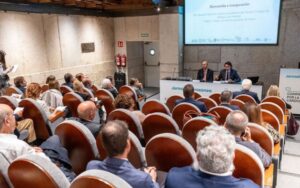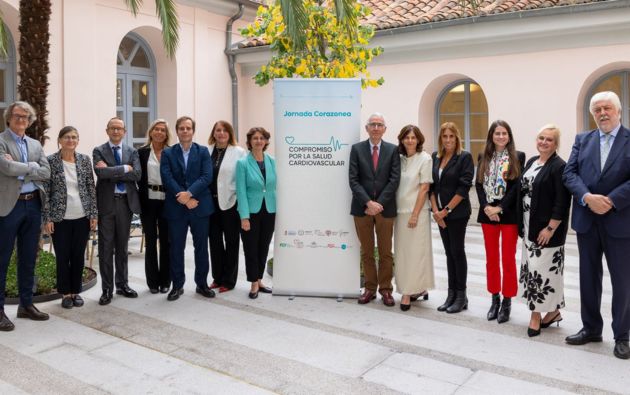Juan Leon Garcia
Just a few weeks after the ‘Commitment to cardiovascular health’ alliance was formed, its first event was held this Tuesday with the aim of updating the initiatives framed in the Cardiovascular Health Strategy and update what are your main challenges ahead. Specifically, for Pablo Cresposecretary general of the Spanish Federation of Health Technology Companies (Fenin) (from which this entity was promoted, which encompasses a dozen entities, from scientific societies, institutions and even patient associations), still “There is a lot of work to do, and that is why all the signatories of this manifesto make a call: to accelerate the approach and early development of cardiovascular diseases in our country”.
And, Crespo pointed out as part of the inauguration of the Corazonea day held at the Illustrious Official College of Physicians of Madrid (Icomem), since the approval in April 2022 of said strategy, its deployment ““It’s not going at the speed we would like.”.
In turn, the president of the Spanish Heart Foundation (FEC), Andres Iniguezhas requested that the Escav become a Plan so “ensure that a budget is associated with it”. “The strategies do not have funding associated with them, while the plans do, which is why the name of Escav should be changed and called Plan, so it would have a designated amount”as expressed and echoed Europa Press.
Meanwhile, the participants in the conference have agreed on the unanimous commitment to better cardiovascular health and how this young alliance has the same objective as expressed by the Dr. Manuel Martínez-Selléspresident of Icomem: “to improve the prognosis of what continues to be the main cause of death in Spain and the world, cardiovascular diseases”.
The participants in the ‘Corazonea’ conference have agreed on the unanimous commitment to better cardiovascular health
However, emphasis needs to be placed on the prevention of this type of pathology, which could considerably reduce mortality. To achieve this, the development of health technologies for diagnosis and treatment is key. As the coordinator of the Cardiovascular Health Strategy of the National Health System (SNS) has reflected, Carla Duenasone of the main objectives of the plan is “improve the level of cardiovascular health.”
For this reason, they work to promote good cardiovascular health, reduce the incidence or extend measures that improve prevention in this regard. Both at a national and European level: the Jacardi project (which focuses on both the cardiovascular part and its connection with diabetes) is one of the most ambitious initiatives in the community context, in which 11 Spanish entities participate.

The holding of this meeting is the result of the ‘Commitment to cardiovascular health’ alliance, promoted by the Cardiovascular, Neurosurgery and Pain Treatment sector of the Spanish Federation of Health Technology Companies, Fenin, and of which a dozen entities. Likewise, the decalogue of measures has been outlined to improve the cardiovascular health of Spaniards and in line with the purposes of the Escav prepared by the alliance.
Cooperation between primary and specialized
On the part of scientific societies, cooperation and coordination between different professionals (both primary and specialized care) has been highlighted to work on improving cardiovascular health among the population.
For him Dr. Luis Rodríguez Padialpresident of the Spanish Society of Cardiology (SEC), the key to the current strategy is that it ends up being implemented more or less homogeneously throughout the territory, taking into account the particularities of each health system in our country. With the ultimate goal, he has completed the Dr. Juan José Legarra Calderónpresident of the Spanish Society of Cardiovascular and Endovascular Surgery (Secce), to improve the patient’s quality of life “as soon as possible.”
In this regard, links with primary care are essential. For the president of the Spanish Society of Primary Care Physicians (Semergen), the Dr. José Polo Garcíathe work lies in “educating and training the patient, and also the caregiver.” That is, in promoting prevention, in which diagnostic tests also gain importance thanks, for example, to CT equipment.
In addition, specialized nursing plays an important role, in the opinion of the Dr. Concepción Cruzadovice president of the Spanish Association of Cardiology Nursing (AEEC), both in care and in improving adherence to the therapeutic regimen, both pharmacological and non-pharmacological, or in promoting telemedicine.
“Collective approach” between administrations
At this meeting, representatives of different administrations have highlighted the need to “join objectives” for a collective approach to cardiovascular health in Spain, taking into account that Escav coexists with other strategies or particular plans of the autonomous communities. Some of them, such as those from the Community of Madrid, Catalonia and Andalusia, have been exhibited in Corazonea.
From the ministerial perspective, Pilar Aparicioresponsible for Coordination of Health Strategies of the Ministry of Health, has corroborated that “Escav is still in the implementation phase and must be done equitably in all territories”. Pilar Aparicio has also advocated for “make the most of the data generated by the strategy’s actions, to understand the health problems of the population and how they evolve.”
Regarding the current situation of the Escav, the participants have highlighted that it has very ambitious objectives and well valued in Europe that, however, have an impact on its “complexity”. This means that, two years after its approval, few autonomous communities have begun the implementation of the Escav. Some of the factors identified refer to the need for greater intersectoral coordination between the different levels of care and the large number of specialists involved.
